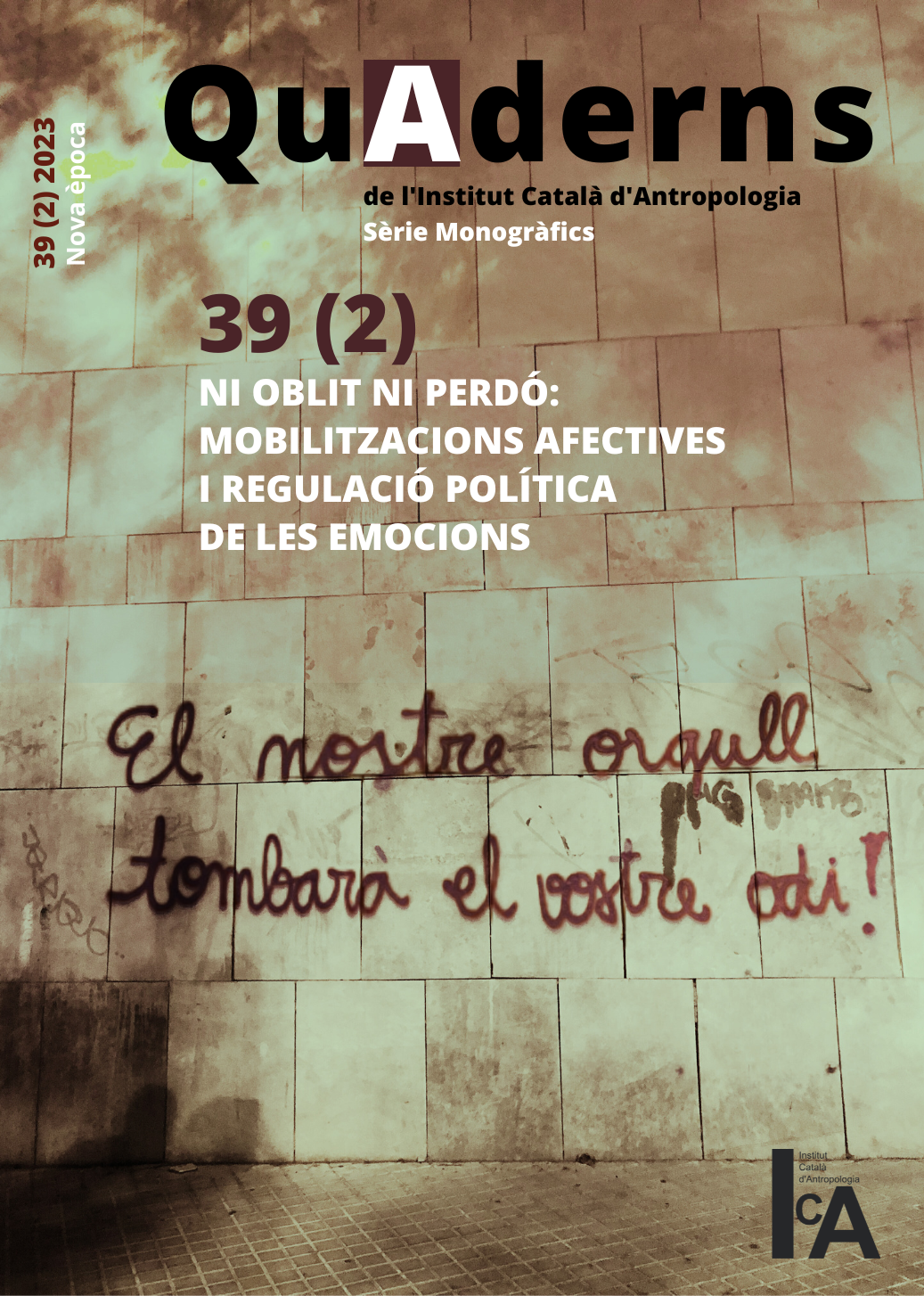Between flags: The political and affective mobilization of flags in the Catalan sovereignty movement
DOI:
https://doi.org/10.56247/qua.499Keywords:
Affects, flag, independentism, cartography, elicitationAbstract
Flags are national objects capable of storing and maintaining divergent affections and releasing them at a given moment. This article aims to understand the emotional functioning of flags in the Catalan sovereignty movement. To do so, we try to describe how the national flags that appear in the Catalan conflict (the blue Estelada, the yellow Estelada and the Spanish Constitutional flag) make different and contradictory affects flourish in the sovereignty movement, are framed in diverse affective
processes, and acquire an emotional directionality and location that create and configure political and affective boundaries within Catalan independence. To identify
emotions and affects, we perform an affective elicitation of free narration about the flags-in-conflict to activists and people close to the Catalan sovereignty and secessionist
movement. As a result, affective cartographies are constructed for each flag and relate the elicited affects with the political and social organizations of Catalan sovereignty. The data show that what we feel and what moves us is
apprehended in a process of constant political interaction between material-semiotic objects and subjects; that is, the idea of a politicization of affects is reaffirmed.
Downloads
Global Statistics ℹ️
|
281
Views
|
121
Downloads
|
|
402
Total
|
|
References
Ahmed, S. (2004). Affective Economies. Social Text, 22(2 (79)), 117-139. https://doi.org/10.1215/01642472-22-2_79-117 DOI: https://doi.org/10.1215/01642472-22-2_79-117
Ahmed, S. (2017). La política cultural de las emociones. Universidad Nacional Autónoma de México. https://doi.org/10.1016/j.emospa.2009.08.005
Anderson, B. (2009). Afective Atmospheres. Emotion, Space and Society, 2(2), 77-81. DOI: https://doi.org/10.1016/j.emospa.2009.08.005
Bargetz, B. (2014). Mapping Affect. Challenges of (Un)timely Politics. En M-L.
Angerer, B. Bösel y M. Ott (Eds.). Timing Affect. Epistemologies, Aesthetics, Politics (pp. 289-302). Diaphanes AG.
Billig, M. (2021). Nacionalismo banal. Capitán Swing.
BOE (2010). Real Decreto 684/2010, de 20 de mayo, por el que se aprueba el Reglamento de Honores Militares. Boletín Oficial del Estado, núm. 125, de 22 de mayo de 2010. Referencia: BOE-A-2010-8188.
Clough, P., y Halley, J. (2007). The Affective Turn. Theorizing the Social. Duke University Press. DOI: https://doi.org/10.2307/j.ctv11316pw
Collier, M. (2001). Approaches to Analysis in Visual Anthropology. En T. van Leeuwen y C. Jewitt (Eds.). Handbook of Visual Analysis (pp.35-65). Sage. https://doi.org/10.4135/9780857020062.n3 DOI: https://doi.org/10.4135/9780857020062.n3
CUP (2019). Ingovernables. Combatem el règim, estenem la rebel·lia. Programa electoral de la CUP-Per la Ruptura a las elecciones al Congreso de los Diputados del 10 de noviembre de 2019.
Curiel, O. (2013). La nación heterosexual. Brecha Lésbica y en la frontera.
Enguix Grau, B. (2012). Cuerpos, camisetas e identidades como estrategias de protesta. En B. Tejerina y I. Perugorría (Eds.). Global Movements, National Grievances. Mobilizing for ‘Real Democracy’ and Social Justice (pp. 175-200). Universidad del País Vasco.
Enguix Grau, B. (2019). Orgullo, protesta, negocio y otras derivas LGTB, Doce Calles.
Enguix Grau, B. (2020). ‘Overflown Bodies’ as Critical-Political Transformations. Feminist Theory, 21(4), 465-481. https://doi.org/10.1177/1464700120967328 DOI: https://doi.org/10.1177/1464700120967328
Enguix Grau, B. (2021). Rebel bodies: feminism as resistance in the Catalan pro-independence left. European Journal of English Studies, 25 (2), 225-248. https://doi.org/10.1080/13825577.2021.1944489 DOI: https://doi.org/10.1080/13825577.2021.1944489
Eriksen, T.H., y Jenkins, R. (Eds.). (2007). Flag, Nation and Symbolism in Europe and American. Routledge. https://doi.org/10.4324/9780203934968 DOI: https://doi.org/10.4324/9780203934968
Flam, H. (2005). Emotions’ map. A research agenda. En H. Flam y D. King (Eds.). Emotions and Social Movements (pp. 19-40). Routledge.
Gramsci, A. ([1949] 2003). Los intelectuales y la organización de la cultura. Ediciones Nueva Visión.
Hochschild, A-R. ([1983] 2003). The Managed Heart: Commercialization of Human Feeling. University of California Press. https://doi.org/10.1525/9780520930414 DOI: https://doi.org/10.1525/9780520930414
Holert, T. (2014). National Heterologies: On the Materiality and Mediality of Flags-Mali 2013. e-flux Journal, 52.
Jasper, J. (2014). Feeling-Thinking: Emotions as Central to Culture. En P. Daphi, B. Baumgarten y P. Ullrich (Eds.). Conceptualizing Culture in Social Movement Research (pp. 23-44). Palgrave. https://doi.org/10.1057/9781137385796_2 DOI: https://doi.org/10.1057/9781137385796_2
Kleres, J. (2011). Emotions and Narrative Analysis: A Methodological Approach. Journal for the Theory of Social Behaviour, 41(2), 182-202.
https://doi.org/10.1111/j.1468-5914.2010.00451.x DOI: https://doi.org/10.1111/j.1468-5914.2010.00451.x
Laclau, E. (2005). La razón populista. Fondo de Cultura Económica.
Martí, J. (2019). Sons i revolta a l'escenari politic català. Quaderns-E de l'Institut Català d'Antropologia, 23(2), 80-98.
Martínez de Albeniz, I. (2020). Objetos en revolución. Hacia una (cosmo)política idiota. Política y Sociedad, 57(2), 415-435. https://doi.org/10.5209/poso.66451 DOI: https://doi.org/10.5209/poso.66451
Muldoon, O.T., Trew, K., y Devine, P. (2020). Flagging difference: Identification and emotional responses to national flags. Journal of Applied Social Psychology, 50(5), 265-275. https://doi.org/10.1111/jasp.12657 DOI: https://doi.org/10.1111/jasp.12657
Ojeda Caba, J. (2023). L’esquerra catalana i el nacionalisme. Ara.cat, en línea. https://www.ara.cat/opinio/esquerra-catalana nacionalisme-julia-ojeda-caba_129_4641038.html
Pease, D.E. (2011). What is Postnationalism?. Hemisphere: Visual Cultures of the Americas, 4(1), 10-12.
Sauer, B. (2019). Mobilizing Shame and Disgust: Abolitionist Affective Frames in Austrian and German Anti-Sex-Work Movements. Journal of Political Power, 12(3), 318-338. https://doi.org/10.1080/2158379X.2019.1669262 DOI: https://doi.org/10.1080/2158379X.2019.1669262
Webster, G.R. (2011). American Nationalism, The Flag, And The Invasion of Iraq. Geographical Review, 101(1), 1-18. https://doi.org/10.1111/j.1931-0846.2011.00069.x DOI: https://doi.org/10.1111/j.1931-0846.2011.00069.x
Wetherell, M. (2012). Affect and Emotion: A New Social Science Understanding. Sage. https://doi.org/10.4135/9781446250945 DOI: https://doi.org/10.4135/9781446250945
Downloads
Published
How to Cite
Issue
Section
License
Distributed under the terms of the Creative Commons Attribution 4.0 International Use and Distribution License (CC BY-NC-SA 4.0)




